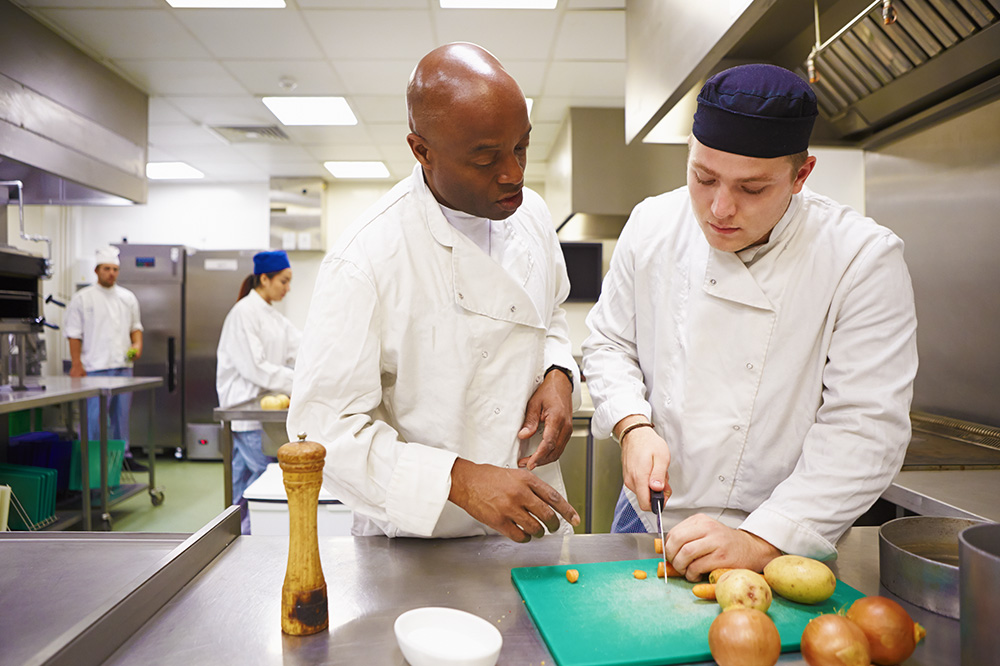Finding cooks for your restaurant can be tough. Finding a head chef to lead your restaurant can be even tougher.
Having a competent, experienced head chef in charge of your back of the house staff is a major key to success in the restaurant industry. Ideally, head chefs train and supervise line cooks so that shifts run smoothly and each plate meets the highest standards.
They handle supply ordering so that the menu has what it needs while still staying within the budget, and they communicate effectively with front of the house staff to ensure guests have the best possible dining experience. Whether originally trained in culinary school or learning from master chefs in the workforce, the best head chefs are diligent, detail-focused, knowledgeable, and creative.
However, the years of strict dedication required to hone their culinary craft, combined with the time it takes to learn the business side of a restaurant, can make developing oneself into a head chef an immense challenge.
The additional day-to-day stresses of running a kitchen are often not worth it for many modern cooks, especially if the restaurants in their area aren’t offering sufficient compensation. This has led to far fewer head chefs in the market, with the really great chefs getting snatched up quickly.
In its 2015 industry forecast, the National Restaurant Association stated that “growth in the number of hospitality job openings accelerated sharply [in 2014], a development that was out of sync with the pace of hiring.”
With so many job openings and so few professional chefs looking for work, it’s more important than ever that you put your best foot forward when listing open positions at your establishment. If you’re struggling to hire a head chef, look at these aspects of your business for clues on where you’re hitting the mark and where you’re missing a beat.
Your Restaurant’s Reputation
The culinary world is very small. Word of mouth travels fast when it comes to your reputation as an employer. Do you keep a positive attitude around your employees? Are you consistent in scheduling? Do you allow your head chef the flexibility to try out new menu dishes? Are you willing to brainstorm with your chef so that the restaurant doesn’t stagnate? Do you empower your employees and reward them for success?
Googling your business or checking sites like indeed.com can give you insight into what former employees are saying. If you’ve struggled to create a positive work environment for your kitchen staff, those issues might be the first things potential hires hear about your restaurant.
Chefs want things to run smoothly in the kitchen, and that includes how you interact with them. Making those changes so that daily interaction with you is an overall positive experience for staff is a key part of building that strong reputation within the industry. Establishing your reputation as a boss takes time, but it’s also crucial part of finding (and retaining) great employees.
Wages
If you’re having difficulty keeping chefs on staff, convincing applicants to take your job offer after the interview, or even just getting qualified candidates to reply to your job listing, the problem could be as simple as how much pay you’re offering.
Research into the market could reveal that you’re below average for hourly wages in your area. If a chef can get better pay at one of your competitors with the same or better prestige, they could pass you by. Even if you’re able to hire, your chef could jump ship if other restaurants are offering them a paycheck in line with their level of skill.
Raising wages for your head or sous chefs means adjusting your budget, but the money and time saved by avoiding constantly training new staff — only to have them take better offers — is huge.

Benefits
There are more perks to taking a restaurant job than just the hourly wage. Do you have any benefits in place? For instance, does your establishment offer dining discounts for staff? Do you provide staff with a free meal during shifts? Are you careful to set up schedules so that staff can have two days off in a row? Do you offer new head chefs the chance to bring in their own assistant staff?
These benefits can seem small, but they add up in a positive way for potential recruits. Implementing even a few of them in your establishment (and then including them in the job listing) adds up to potential employees considering more than just paychecks alone.
Providing any of these benefits can make you more appealing to experienced chefs looking for work. If you’re trying to reel in those top notch cooking professionals, consider implementing these or similarly creative programs.
Should You Hire a Restaurant Job Recruiter?
Even after putting these suggestions in motion to make yourself a more desired employer, you might not have to the time to go searching for new chefs. How do you even know where to look, right? This is where recruiters can come in handy.
Hiring a food service recruiting agency is an investment that could pay off for you down the line. The recruiter can do the research needed to find precisely the right chef for your business.
Recruiters can take these changes you’ve made and help sell your business to potential hires. Look for one who has been in the industry for years and has searching for great chefs down to to a science. By leaving that work to the recruiter, you can go back to what you do best – running your restaurant.
Need that financial boost to back a hire you know can generate revenue over time? Explore our funding options that bring new customers through your door as well:
Is merchant cash advance right for you? »






